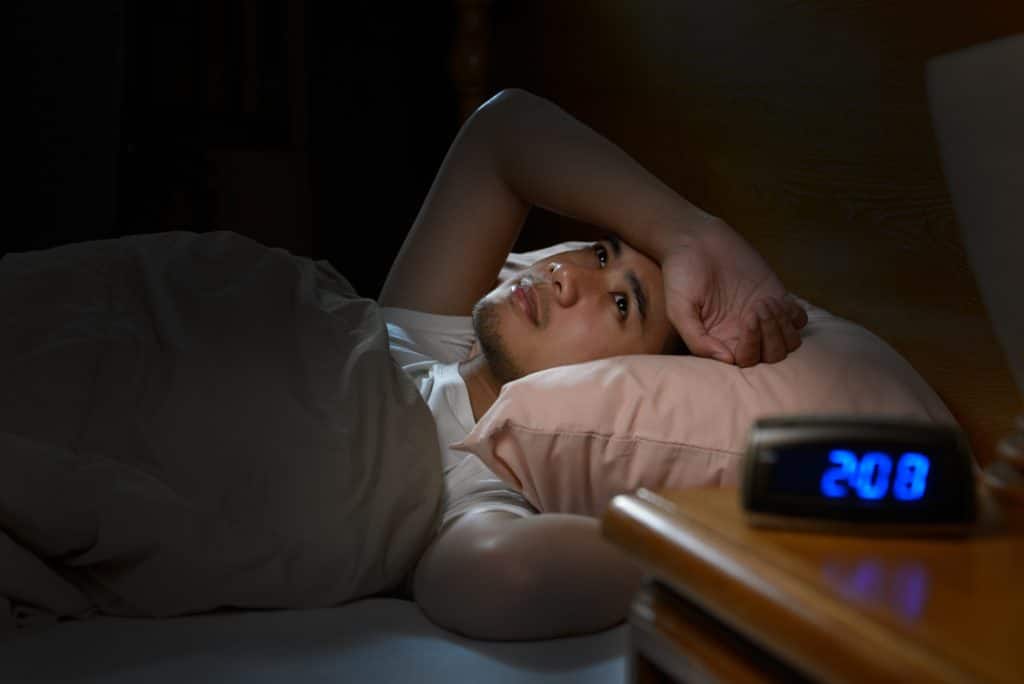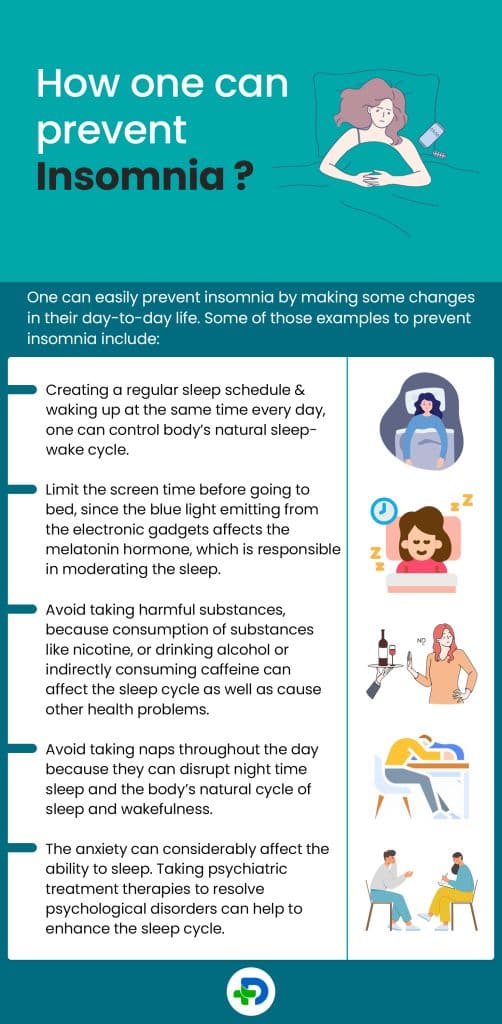Insomnia: Symptoms, Causes and Management

- Insomnia
- 27 Sep 2023
Overview
What is Insomnia?
Insomnia is a long pattern of a sleep problem that’s not only a nighttime issue but it trickles into the daytime in some ways. It is a kind of a sleep disorder in which one may find difficulty in sleeping or making it hard to stay asleep.1Overview| Researched based study from Mayoclinic.org It can have negative effect on individual’s level of energy, health and work performance. In other words, it is a problem falling asleep or a total inability to do so for an extended period of time. People who have this disorder are dissatisfied with their sleeping habits and may feel exhausted throughout the day.

Types
What are the different types of insomnia?
Insomnia can last long as for several months and can be short even for few hours. The duration of it differentiates from one person to the another and hence is categorized into several different types. Some of the common types of insomnia are:
Acute insomnia
- A person might have acute insomnia due to stress at work or it could be because of some personal relationship issues. It can usually can last for a few days to a few weeks.
Chronic insomnia
- A person who is going through mental health conditions like depression, anxiety is found to have Chronic insomnia and which can usually last for more than 2 months, occurring thrice in a single week.2Types| Researched based study from Nlm.nih.gov
Onset insomnia
- This is often related Initial insomnia, in which person finds difficult in falling asleep during the beginning of the night. People with such type of insomnia may take a long time to fall asleep during the first few hours of sleep. It is often caused by neuropathic or musculoskeletal pain or medications.
Maintenance insomnia
- This is related with Medium Insomnia in which person finds difficulty staying asleep throughout the night, often characterized by frequent awakenings or early morning awakenings or have trouble falling back asleep after waking up, usually because of the muscle spasms, nocturia. It is often followed by terminal insomnia.
Comorbid insomnia
- This is usually found in people, who have insomnia existing in conjunction with another medical or psychiatric condition like a chronic pain, medical apnea or depression.3Types| Researched based study from Stanfordhealthcare.org
Psychophysiological insomnia
- People who are having anxiety and who constantly take stress about sleep and have racing heartbeat or muscle tension problems are found to carry psychophysiological insomnia.
Causes
What are the causes of insomnia?
Insomnia can be caused by a range of factors, including
Medical conditions
- It is found that people with certain medical illnesses like hyperthyroidism, muscular spasms, bronchial asthma, arthritis and Parkinson’s disease, experience changes in their sleep cycle. These conditions either make a person fall asleep or stay asleep.
Mental health issues
- People with mental health conditions such as anxiety, depression, post-traumatic stress disorder (PTSD), and obsessive-compulsive disorder (OCD) can cause racing or repetitive thoughts and worries that keep you awake which can hence cause insomnia.4Causes| Researched based study from Mind.org.uk
Medications
- People who take antidepressant medicines, blood pressure medications, can cause side effects and disrupt the sleep cycle and hence cause insomnia.
Lifestyle factors
- Sometimes taking considerable amount of caffeine either directly or indirectly through, coffee, soft drinks or alcohol can also be a cause of irregular sleep schedules leading to insomnia.
External factors
- The absence of a supportive mattress can also be a cause of insomnia. Sometimes people don’t find comfortable sleeping bed which usually affect their backbone and neck region, which don’t let them sleep throughout the night. Even the environmental factors like lightening, temperature can also be a cause for insomnia.
Shift work sleep disorder
- It is known as SWSD, and it can be a cause for insomnia to happen because peoples’ internal body clocks are switched, which causes difficulties in adjusting to a different sleep/wake schedule.5Causes| Researched based study from Clevelandclinic.org
Stress
- People who are struggling with their personal relationships, or whom they have recently lost or due to the problems at their working organization can also be a troublesome cause for them to have Insomnia.
Genetics
- It is possible people to have insomnia if anyone from the closest of their family has this illness. Hence, genetics can too be a cause for insomnia to occur.
Symptoms
Symptoms of insomnia
Insomnia symptoms differ from person to person. Not everyone with insomnia will experience all of these symptoms however some of the common symptoms are:
- Difficulties falling asleep: Some people who suffer from insomnia may wake up repeatedly during the night and have difficulty falling back asleep.
- Tiredness or grogginess during the day: Insomnia can produce daytime drowsiness or low energy, causing a difficulty in paying attention or accomplishing daily duties.6Symptoms| Researched based study from Hopkinsmedicine.org
- Irritation and mood fluctuations: Person who has sleep deprivation may feel irritable, with mood swinging constantly, and other emotional problems which require certain psychiatric attention.
- Depression and anxiety: People who have insomnia may begin to notice a disruption in their state of being and often feel anxious over small things.7Symptoms| Researched based study from Dukehealth.org
- Reduced performance: One may start to lose the ability to perform efficiently and quickly during their working hours While if found in children, they may feel tiresome during their school time.
- Increased incidents mistakes: Due to the lack of sleep, people may start to lose the concentration during their work time or during other activities, which can even further cause accidents.
- Observative Symptoms: If someone has Insomnia, they might observe certain symptoms like frequent headaches, dyspepsia, muscular spasms.
Diagnosis
Diagnosing insomnia
The precise insomnia treatment plan will be determined by the individual’s problem, as well as any additional medical or psychiatric disorders they may be experiencing. However, a complete assessment of a person’s sleep habits, medical history, and general health is usually required to diagnose insomnia which shall be taken by the healthcare professional, beginning with asking the patient:
- To keep a sleep diary for a week or two to record their sleeping patterns and any symptoms they encounter in order to identify insomnia.
- Request diagnostic procedures, such a sleep study, to assess the subject’s quality of sleep and rule out any underlying medical issues that might be causing their insomnia.
- To investigate any potential medical conditions or mental health problems that may be contributing to or worsening your insomnia.
- After the diagnosis has been done, the doctor may recommend some treatment and preventive measures which can reduce insomnia, and may ask for a revisit if the situation is not settled.
- In some cases, doctor may recommend psychological treatment like Cognitive-Behavioral Therapy for Insomnia (CBT-I), which can assist in addressing unfavorable thought patterns and behaviors that might be preventing you from falling asleep.8Diagnosis| Researched based study from Mayoclinic.org
Vulnerability
Who are at risk?
The people who can develop insomnia totally depends on the condition and the severity one has developed. However, there are certain risk factors which are associated with insomnia, they include
Age
- People especially women who are in their early 60’s is more likely to experience insomnia. One of the common factors can be because of the hormonal changes, i.e., menopause. While in men, sleep apnea can cause insomnia.
Mental health issues
- People who have anxiety, depression, or any other mental health issues are more likely to get insomnia.
Chronic pain
- People who have chronic pain problems like arthritis, muscular spasms or fibromyalgia can also be at a risk factor to get insomnia.
Medical conditions
- Certain medical issues can also make it difficult to fall asleep and raise the chance of developing insomnia.
Drugs
- Excessive intake of drugs, pills, or caffeine and nicotine into your body can also disrupt the sleep cycle and and raise the risk of insomnia and other health problems as well.
Shift work
- Some people do prefer working during the night shifts which make them more prone to develop this illness and have higher prevalence of insomnia as compared to non-shift workers, because there is a complete change and disturbance in the sleep cycle.9Vulnerability| Researched based study from Nlm.nih.gov
Management
Management and Treatment
There are different treatments associated with insomnia which has been diagnosed in different person. Patient can take one of the following treatments to get rid of insomnia:
Psychological Treatments
- This is basically a kind of a verbal treatment with the therapist & often known as CBT-I (Cognitive Behavioral Therapy for Insomnia).8Management| Researched based study from Mayoclinic.org This treatment helps individuals know and modify the negative thought process which may be causing insomnia. Basically, this treatment improves the sleep quality and quantity, by reducing the identified factors.
Prescribed medications
- People who finds difficulty in sleeping are prescribed sleeping pills, like, benzodiazepines or non-benzodiazepine hypnotics. It is prescribed to people with short-term sleeping problem. But consumption of such sedatives for prolonged duration can generally affect health and can cause extreme side effects.
Massage therapies
- Massage therapies like Deep tissue massage, Aromatherapy and Acupuncture relaxes the body tissues by reducing the muscle tension which can help people to get a better sleep.
Transform your lifestyle
- Try changing the sleeping mattresses which are causing you trouble during your beauty sleep along with the change in your sleeping cycle. Changing your sleeping patterns and way of life in general can frequently help you get better sleep.
Prevention

How one can prevent insomnia?
One can easily prevent insomnia by making some changes in their day-to-day life. Some of those examples to prevent insomnia include:
- Creating a regular sleep schedule and waking up at the same time every day, one can control body’s natural sleep-wake cycle.
- Limit the screen time before going to bed, since the blue light emitting from the electronic gadgets affects the melatonin hormone, which is responsible in moderating the sleep.
- Avoid taking harmful substances, because consumption of substances like nicotine, or drinking alcohol or indirectly consuming caffeine can affect the sleep cycle as well as cause other health problems.
- One can reduce stress and other mental health conditions (which are one such responsible factor for insomnia), by practicing yoga and meditation, involving deep breathing, accompanied by a few physical exercises can help the person to reduce the risk of insomnia.
- Avoid taking naps throughout the day because they can disrupt night time sleep and the body’s natural cycle of sleep and wakefulness.
- The anxiety can considerably affect the ability to sleep. Taking psychiatric treatment therapies to resolve psychological disorders can help to enhance the sleep cycle.
Prognosis
Prognosis of insomnia
Prognosis for insomnia is dependent on the condition one has developed so far. But, by performing certain changes in their daily routine one can easily transform a better sleep into their sleep cycle. However, in some cases, the treatment must be handled under the guidance of a medical healthcare professionals including doctors and psychiatrists.
Following the prescribed medicated drugs or counseling can also help the person to get rid of insomnia. But in some of the cases, insomnia can be a chronic condition, and the patient might require long term treatment which can also cause side effects, since medicated drugs when overdosed often cause health care issues, especially mental health issues. Similarly, if someone take the risk to avoid the problem and left the insomnia untreated, this can also relatively elevate the chance of depression and anxiety as well as an increased risk of accidents due to lack of sleep.
Overall, insomnia is a prevalent sleep issue that can lower a person’s quality of life. However, with the right management and treatment therapy, the majority of people are able to improve their sleep quality and lessen the effects of insomnia on their general health and well-being.
Any feedback on this article?
 This Articles content was accurate
This Articles content was accurate Very Informative Article
Very Informative Article I have a question or a comment
I have a question or a comment
 This article contains inaccurate content
This article contains inaccurate content This article was not helpful
This article was not helpful I have a question or a comment
I have a question or a comment
We appreciate your helpful feedback!
Checkout our social pages
References
-
Mayo Clinic
Insomnia | Overview
-
National Library of Medicine
Insomnia | Types
-
Stanford Medical Center
Types of Insomnia | Types
-
MIND
Types of mental health problems | Causes
-
Cleveland Clinic
Shift work sleep disorder (SWSD) | Causes
-
Johns Hopkins Medicine.
Insomnia | Symptoms
-
Duke Health.
A vicious cycle: Insomnia, anxiety, and Depression | Symptoms
-
Mayo Clinic
Insomnia treatment: Cognitive behavioral therapy instead of Sleeping Pills | Diagnosis | Management
-
National Library of Medicine
Shift work and sleep: Medical Implications and Management. Sleep medicine and disorders | Vulnerability



































